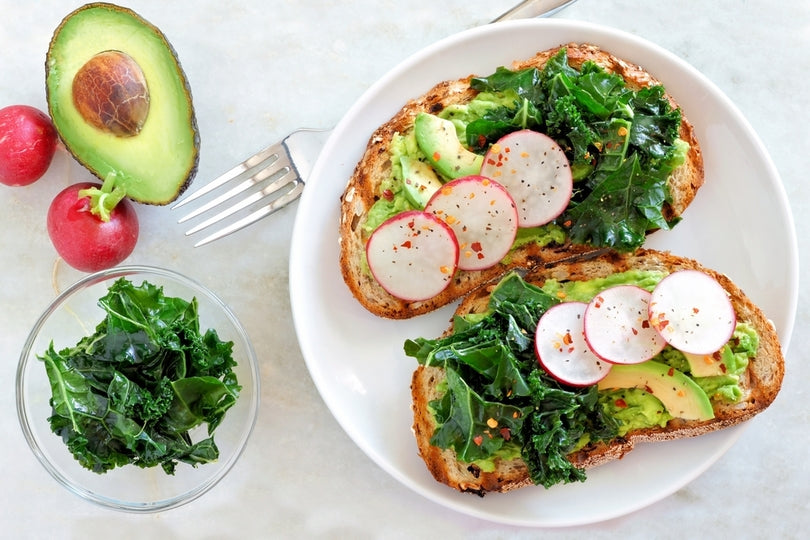Is It Okay To Eat Carbs Before Bed?


Who has heard the 'rule' that you shouldn't eat carbs before bed? This has been around for a long time and SO many people follow it.
The misconception here is that there are certain times of day when the carbs you consume are more likely to be stored as fat, rather than being used as energy. Depending on your work and training schedule, it may not be possible to avoid eating carbs at night.
Jump to:
- Is it okay to eat carbs at night?
- When is the best time to eat carbs?
- What types of carbs are best to eat at night?
- Planning when to eat carbs
- Eating carbs during the day
I believe it IS okay to eat carbs at night, and here is why:
It's a myth that you aren't using up the energy from carbs at night if you're not active or go straight to sleep! In fact, eating carbs at night provides your body with much-needed fuel. Let me explain how your body actually uses carbs.
Is it okay to eat carbs at night?
Eating carbs in the evening may help you to have a better sleep by reducing stress hormones like cortisol and boosting serotonin, which helps you to feel relaxed and sleepy.
Your body needs carbohydrates when you are active, but it also burns them when you are at rest. In fact, your body may even burn fat while you sleep. Whether you’re doing a HIIT workout, watching TV or taking a nap, your brain, heart, lungs and other organs need energy in order to function.
Even when we are resting, there are many essential processes happening inside of our bodies that keep us alive and ensure that we recover from exercise. These processes require energy received from macronutrients, including carbohydrates, that we eat.
It actually doesn’t matter WHEN you eat carbohydrates. The energy you get from carbohydrates will only be stored as fat if it is in excess to your energy requirements.
This means that eating carbohydrates at night doesn’t necessarily make you gain weight. It’s eating an excess of carbohydrates, at any time of day, which may lead to weight gain. That is an important point that you need to remember.
Your total carbohydrate requirements will depend on both your level of activity and your health and fitness goals.

When is the best time to eat carbs?
Well-timed carbohydrate intake can ensure that you have the energy to train and recover well.
In fact, eating carbs right after a workout can help to repair the micro-damage that you do to your muscles during the workout. This means that your training schedule plays a role in the optimal time to eat carbs.
For anyone who isn’t a morning person, or maybe you don't have the time to fit in your exercise before work — you probably prefer to workout in the evening. If you work at a desk all day, you may find that you aren’t very active until it’s time for your evening workout.
After an evening workout, you NEED carbs to help your muscles recover properly and replenish glycogen stores. Glycogen is stored in the liver and muscle and can be quickly converted to energy when needed.
It’s ideal to time your carb intake around your exercise. However, if you workout in the morning, but your main carb meal is for dinner, this won’t have any effect on your weight as long as you are still eating the recommended amount of carbohydrate for you and your goals.
It’s important to remember that staying healthy is all about following a holistic approach to nutrition and exercise.

What types of carbs are best to eat at night?
Complex carbohydrates are the best type of carbohydrates, and these are the ones that are best eaten at night. Complex carbs include sweet potatoes, brown rice, wholemeal pasta and bread, oatmeal and bran.
Complex carbohydrates are digested slower than refined carbohydrates, so they provide sustained energy and keep you feeling full for longer. If you choose to eat a small portion of carbs at night they will keep you sustained until breakfast. Complex carbs also contain magnesium which can help to reduce anxiety, so eating them at night can help you to sleep better.
Refined or simple carbohydrates are found in processed foods. These carbs are low in fibre and easily digested for short term energy. Some examples of refined carbs include white rice and pasta, sweets, cakes, candy, and white bread. Simple carbs provide a rush of energy in the short term but can leave you feeling hungry soon after.
If you find yourself needing a snack after dinner, try one of these healthy late night snacks to keep you satisfied until breakfast.
Planning when to eat carbs
If you tend to be more sedentary during the day, keep this in mind: what you are eating during the day should be enough to fuel you and keep your energy levels up.
Eating balanced meals and snacks throughout the day can help to minimise food cravings in the evening. That way after dinner you won’t be tempted to binge on three blocks of chocolate in the evening.
At night, the food you eat should be nutrient-rich so that your body can build and maintain muscle, replenish energy reserves, recover from the demands of the previous day and prepare for the next day.
Eating carbs during the day
For each of my main meals, I pair complex carbohydrates with a lean source of protein such as chicken or fish. This helps me to feel full and provides a continuous stream of energy until my next meal.
I do have snacks between meals, usually fruit or veggies that provide my body with important vitamins and minerals.
The best time to eat carbs is when it suits you!
If you workout in the morning, you might choose to have carbohydrates like cereal or toast for breakfast. That doesn’t mean you can’t have any more carbs that day! Remember, how you distribute your carb intake should suit you and your lifestyle. Living a healthy lifestyle should be enjoyable and sustainable — not a short term fad!
* Disclaimer: This blog post is not intended to replace the advice of a medical professional. The above information should not be used to diagnose, treat, or prevent any disease or medical condition. Please consult your doctor before making any changes to your diet, sleep methods, daily activity, or fitness routine. Sweat assumes no responsibility for any personal injury or damage sustained by any recommendations, opinions, or advice given in this article.




<#= c.user.username #><#= moment(c.created_at * 1000).fromNow() #>
<#= c.html_body #> <# if (c.images) { #>
<# } #>